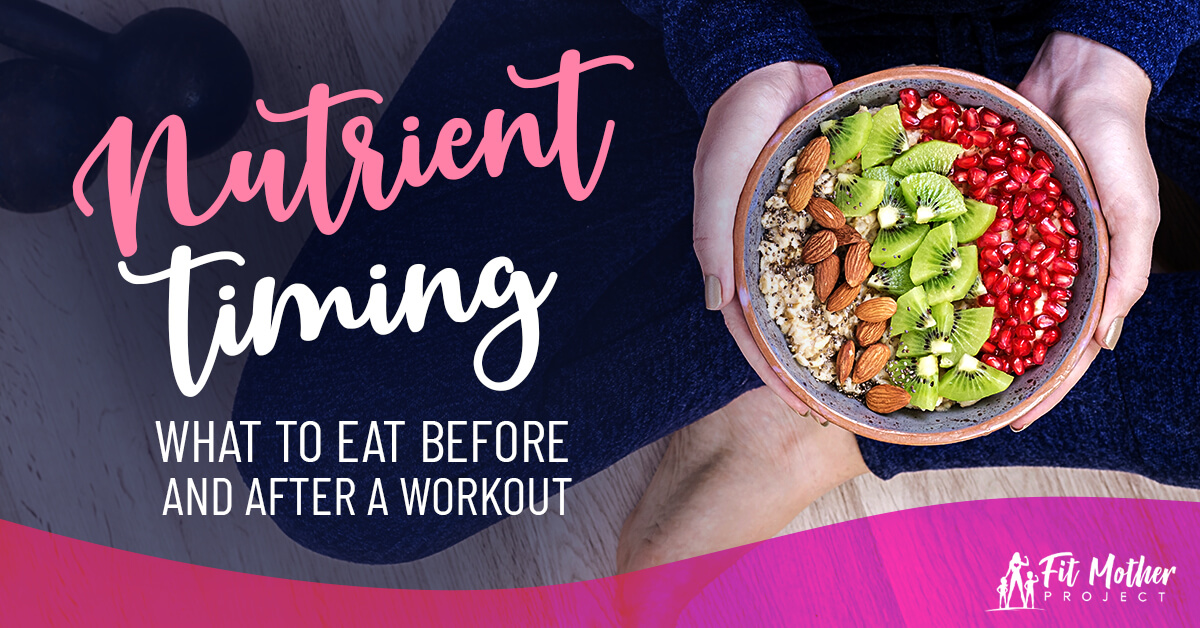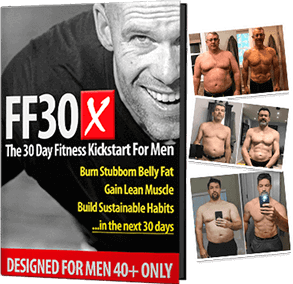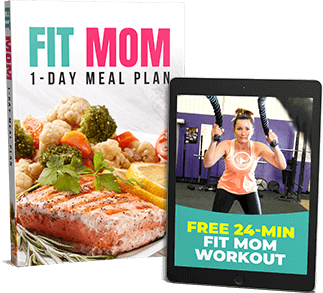We all know how important our nutrition is to living a fit and healthy lifestyle. But it's not just the types of foods that matter, but also your nutrient timing.
The food you eat every day is made up of macronutrients and micronutrients.
Micronutrients are the vitamins and minerals in foods that supplement your body to support your overall health.
Macronutrients are the components of food that supply your body with energy to get you through the day. These are carbohydrates, protein, and fat.
Each of these macronutrients plays a specific role in your health and fitness.
Carbohydrates and protein are essential for exercise, and this makes their timing around your workout critical.
Here's what you need to know about nutrient timing and how to incorporate it before and after your workouts, and throughout your busy day.
Are energy drinks bad for you? Find out the truth!
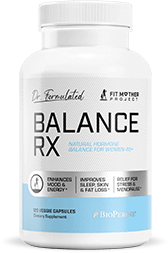
![]()
The Natural Hormone Balancer Busy Women 40+ Are Using For Improved Mood, Sleep, Skin, Stress & Easier Weight Loss

Protein Intake
If you want to build strength and gain muscle, you need to consume an adequate amount of protein.
Protein is the building block for muscle growth and maintenance.
Therefore increasing protein intake is key to rebuilding muscle after a tough workout.
Protein is a macronutrient that not only builds muscle but also spares muscle mass.
This becomes even more important if you are trying to lose weight.
One study found that individuals on low-calorie diets that consumed a higher proportion of protein gained more lean muscle mass and lost more fat.
This was even when performing strength training and high-intensity interval training six days a week.
You need to include lean protein sources in your diet throughout the day, and also time protein intake before and after your endurance and resistance workouts.
How much protein do we need per day? Calculate your daily protein intake!
Post Workout Nutrient Timing
Protein Post-Exercise
The period of time immediately after exercise is typically considered the most crucial part of nutrient timing.
Consuming protein post-exercise helps rebuild damaged muscle fibers and restore glycogen to exhausted tissues.
Plus, it improves body composition and exercise performance.
This critical time for protein intake immediately after exercise is sometimes referred to as the “anabolic window.”
But why is this window important?
Increase Muscle Protein Synthesis and Decrease Muscle Breakdown
One of the most talked-about benefits of post-workout nutrient timing is that it enhances muscle protein synthesis.
Resistance training on its own has been shown to lead to an increase in protein synthesis following exercise.
However, this is also counterbalanced by continued muscle breakdown due to the workout itself.
Studies show that muscle protein breakdown is only slightly elevated immediately post-exercise and then rapidly rises.
In fact, protein breakdown can last for up to 24 hours after a workout.
In order to maximize muscle protein synthesis, you should consume high-quality protein, typically with carbohydrates.
This has been shown to improve muscle synthesis more than just consuming carbohydrates on their own.
Researchers have also found that consuming protein as soon as possible after exercise is more beneficial for muscle growth than delaying consumption.
For example, in one study, participants consumed supplements containing 10 grams of protein, 8 grams of carbohydrate, and 3 grams of fat.
This was either done immediately after or three hours after exercise.
Protein synthesis of the legs and whole body was increased threefold when the supplement was ingested immediately after exercise.
However, when intake was delayed protein synthesis only increased 12%.
The amount of protein intake after exercise will vary, but generally, 0.4–0.5 grams per kilogram of lean body mass post-exercise is a good guideline to follow.
This is consistent with evidence demonstrating a maximal anabolic effect of around 20–40 grams of protein.
As a busy women, it’s challenging to stay consistent with healthy eating. That’s why we created SuperFuel… the delicious “all-in-one” nutrition shake for busy women 40+ to give your body the protein + key nutrients you need for more energy, fat burning, and muscle building.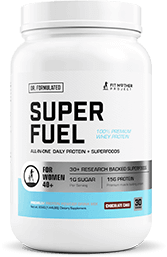
![]()
Meet SuperFuel. The Delicious Protein Shake Packed With 40+ Energy-Boosting Vitamins & Superfoods (Designed For Busy Women)

Carbohydrates
Contrary to some popular fad diets, carbs are not the enemy.
Carbohydrates are the key macronutrient for endurance exercise, and play a crucial role in muscle building as well.
Glycogen, which is your body’s stored form of carbohydrates, is essential for peak endurance and strength training.
Studies show a more rapid replacement of depleted glycogen stores when carbohydrates are consumed immediately post-exercise.
On the other hand, when consumption is delayed by just 2 hours this can slow the rate of muscle glycogen resynthesis by as much as 50%.
In addition, there is evidence that combining protein and carbohydrates after a workout further increases glycogen resynthesis.
This is all the more reason to grab that post-workout nutrition!
Carb Up for Endurance and Strength
Carbohydrates aren’t just essential for endurance exercise either.
This nutrient is essential for muscle growth and resistance training performance as well.
Studies have shown that weight training exercise combined with carbohydrate consumption results in significantly greater gains in both type I and type II muscle fibers when compared to weight training alone.
So after a high-intensity strength training workout, you should consume both protein and carbohydrates.
This will maximize your muscle growth potential.
Consuming protein and carbs post-exercise is even more important if you are performing a fasted workout.
This is common if you work out first thing in the morning.
After an overnight fast, you definitely need immediate nutrient intake after a workout in the form of protein and carbohydrates.
This will promote muscle protein synthesis and reduce muscle breakdown.
Those are good carbs, but what are the worst carbs to eat?
Pre-Exercise Intake
A lot of women already know how important it is to eat after a workout.
The trickier part of nutrient timing is figuring out when to eat before exercise.
You need to adequately fuel your activities so that you can perform at your highest potential.
If you go too long between eating and a workout you could fade halfway through.
However, you also want to avoid GI distress, such as stomach cramps or nausea, during an intense workout.
Another factor to consider is that the food you eat prior to your workout will also influence how quickly you need to consume nutrients after you finish.
If you eat close enough to when you start your activity, you don’t necessarily need to eat right after exercise as these nutrients will still be around to be absorbed and utilized for muscle and glycogen restoration and repair.
If you want to maximize strength gains prior to a resistance workout, you should try to consume a pre-exercise meal within 1-2 hours of your activity.
Depending on its size and composition, this meal can function as both a pre- and an immediate post-exercise meal, since the absorption can persist well into the recovery period.
However, if you workout 3–4 hours after your last meal, you should consume at least 20 grams of protein (or around 0.4-0.5 grams per kilogram lean body mass) as soon as possible after exercise to expedite muscular recovery and growth.
Nutrient Timing for Performance and Recovery
What you consume before and after a workout can play a major role in how well you can perform and recover from exercise.
Plus, your pre- and post-workout nutrition will also determine how well your body and muscles respond to your training once you are finished.
If you aren’t properly fueled for your activities, you can’t give a full effort.
This will lead to submaximal workouts and stalled fitness gains.
And if you don’t provide your body with nutrients after a tough gym session, your muscles can’t recover properly to repair and rebuild.
In the end, this means less muscle mass, and a lower resting metabolic rate.
So to get the most benefit from your hard efforts in the gym, you should aim to have a pre-workout snack ideally about 2 to 3 hours before your workout.
Since you need energy, this should be a carbohydrate-rich snack of about 200 to 300 calories that also contains around 15-25 grams of protein.
Nutrient Timing Around Your Workouts
After a workout, you want to time your nutrient intake so that your muscles have the fuel they need for recovery.
You definitely don’t want to waste all the hard work you just did!
While the “anabolic window” isn’t set in stone, your best bet is to try to get a protein and carbohydrate-rich snack or meal in as soon as you can after an intense workout.
However, if you have to delay eating, this isn’t a deal-breaker either.
A meta-analysis in the Journal of the International Society of Sports Medicine showed that the time period where muscles will have their biggest response to nutrient intakes can actually last from four to six hours.
To avoid GI issues while working out avoid foods that are high in fiber.
You may also want to skip processed foods that contain ingredients such as sugar alcohols as these can cause gas and bloat.
It may take some trial and error to determine what nutrition works best for you prior to exercise.
Generally, simple carbs that can be digested more quickly, like a banana or white toast with peanut butter are good options.
You can experiment with your workouts to figure out what works best.
Some good choices include a protein shake, peanut butter and an apple, or yogurt and nuts.
Some people even love chocolate milk since it has an ideal ratio of carbohydrates, protein, and fat to refuel after a tough workout.
By timing your nutrient intake to coincide with exercise you can perform at your highest capacity and make the most out of each and every workout!
Holly is an osteopathic physician, runner, triathlete, and fitness and nutrition enthusiast. She is board certified in nephrology and internal medicine, has a bachelors degree in dietetics and is a certified personal trainer with NASM-PES certification. Holly has completed four full ironmans, twelve marathons, countless half ironmans, olympic distance triathlons, half marathons and numerous other road races. Holly joined the Fit Father Project in May 2019 as a regular writer, contributing articles on health, wellness, exercise, and nutrition. She has also recently qualified for the 2020 World Championships for Ironman 70.3, in New Zealand!![]()
Fit Mother Project is the answer you’ve been looking for. Inside the program, you’ll receive: Our Fit Mother 30X Program (FM30X) is the answer you’ve been looking for. Inside FM30X, you’ll receive:If you’re a busy mom who wants to finally lose weight,
get healthy, and actually keep the pounds off for good,
this is the simple program you’ll love sticking to…
If you’re a busy mom who wants to finally lose weight,
get healthy, and actually keep the pounds off for good,
this is the simple program you’ll love sticking to…
LEARN MORE ABOUT FM30X »
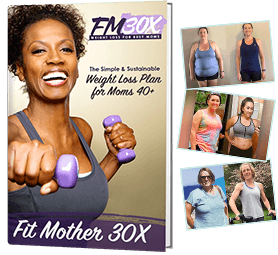
Learn More About FM30X

*Please know that weight loss results & health changes/improvements vary from individual to individual; you may not achieve similar results. Always consult with your doctor before making health decisions. This is not medical advice – simply very well-researched info on nutrient timing.

